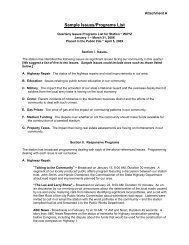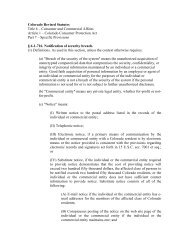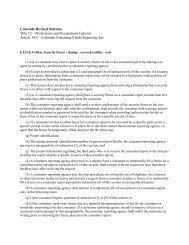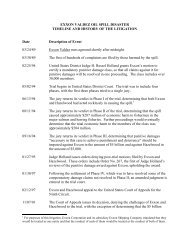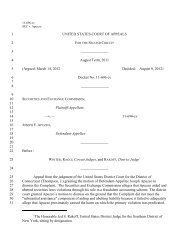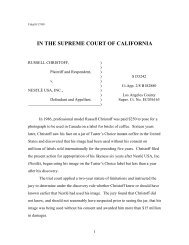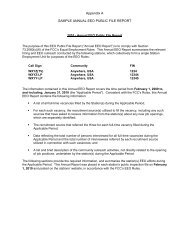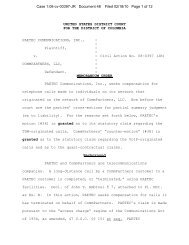QUANTA SERVICES INC, QUANTA SERVICES MANAGEMENT ...
QUANTA SERVICES INC, QUANTA SERVICES MANAGEMENT ...
QUANTA SERVICES INC, QUANTA SERVICES MANAGEMENT ...
Create successful ePaper yourself
Turn your PDF publications into a flip-book with our unique Google optimized e-Paper software.
<strong>QUANTA</strong> <strong>SERVICES</strong>, <strong>INC</strong>. AND SUBSIDIARIES<br />
NOTES TO CONSOLIDATED FINANCIAL STATEMENTS — (Continued)<br />
intangibles and long-lived asset impairments, equity investments, loan receivables, purchase price allocations,<br />
liabilities for self-insured and other claims, multi-employer pension plan withdrawal liabilities, revenue<br />
recognition for construction contracts and fiber optic licensing, share-based compensation, operating results of<br />
reportable segments, as well as the provision (benefit) for income taxes and the calculation of uncertain tax<br />
positions.<br />
Reclassifications<br />
Certain reclassifications have been made in prior years’ segment disclosures to conform to classifications<br />
used in the current year.<br />
Cash and Cash Equivalents<br />
Quanta had cash and cash equivalents of $315.3 million and $539.2 million as of December 31, 2011 and<br />
2010. Cash consisting of interest-bearing demand deposits is carried at cost, which approximates fair value.<br />
Quanta considers all highly liquid investments purchased with an original maturity of three months or less to be<br />
cash equivalents, which are carried at fair value. At December 31, 2011 and 2010, cash equivalents were $165.9<br />
million and $460.8 million, which consisted primarily of money market mutual funds and investment grade<br />
commercial paper and are discussed further in “Fair Value Measurements” below. As of December 31, 2011 and<br />
2010, cash and cash equivalents held in domestic bank accounts were approximately $230.9 million and $509.6<br />
million and cash and cash equivalents held in foreign bank accounts were approximately $84.4 million and $29.6<br />
million.<br />
Current and Long-Term Accounts and Notes Receivable and Allowance for Doubtful Accounts<br />
Quanta provides an allowance for doubtful accounts when collection of an account or note receivable is<br />
considered doubtful, and receivables are written off against the allowance when deemed uncollectible. Inherent<br />
in the assessment of the allowance for doubtful accounts are certain judgments and estimates including, among<br />
others, the customer’s access to capital, the customer’s willingness or ability to pay, general economic and<br />
market conditions and the ongoing relationship with the customer. Quanta considers accounts receivable<br />
delinquent after 30 days but does not generally include delinquent accounts in its analysis of the allowance for<br />
doubtful accounts unless the accounts receivable have been outstanding for at least 90 days. In addition to<br />
balances that have been outstanding for 90 days or more, Quanta also includes accounts receivable balances that<br />
relate to customers in bankruptcy or with other known difficulties in its analysis of the allowance for doubtful<br />
accounts. Under certain circumstances such as foreclosures or negotiated settlements, Quanta may take title to<br />
the underlying assets in lieu of cash in settlement of receivables. Material changes in Quanta’s customers’<br />
business or cash flows, which may be impacted by negative economic and market conditions, could affect its<br />
ability to collect amounts due from them. As of December 31, 2011 and 2010, Quanta had total allowances for<br />
doubtful accounts of approximately $3.8 million and $7.3 million, of which approximately $3.8 million and $6.1<br />
million was included as a reduction of net current accounts receivable. Should customers experience financial<br />
difficulties or file for bankruptcy, or should anticipated recoveries relating to receivables in existing bankruptcies<br />
or other workout situations fail to materialize, Quanta could experience reduced cash flows and losses in excess<br />
of current allowances provided.<br />
The balances billed but not paid by customers pursuant to retainage provisions in certain contracts are<br />
generally due upon completion of the contracts and acceptance by the customer. Based on Quanta’s experience<br />
with similar contracts in recent years, the majority of the retainage balances at each balance sheet date are<br />
expected to be collected within the next twelve months. Current retainage balances as of December 31, 2011 and<br />
2010 were approximately $117.1 million and $119.4 million and are included in accounts receivable. Retainage<br />
82




